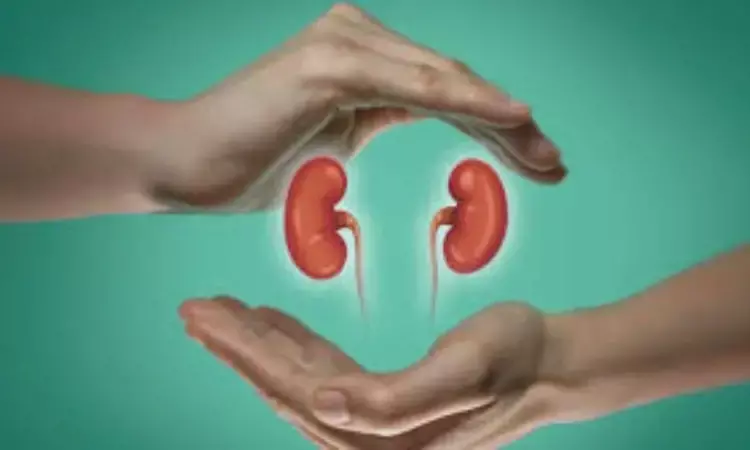- Home
- Medical news & Guidelines
- Anesthesiology
- Cardiology and CTVS
- Critical Care
- Dentistry
- Dermatology
- Diabetes and Endocrinology
- ENT
- Gastroenterology
- Medicine
- Nephrology
- Neurology
- Obstretics-Gynaecology
- Oncology
- Ophthalmology
- Orthopaedics
- Pediatrics-Neonatology
- Psychiatry
- Pulmonology
- Radiology
- Surgery
- Urology
- Laboratory Medicine
- Diet
- Nursing
- Paramedical
- Physiotherapy
- Health news
- Fact Check
- Bone Health Fact Check
- Brain Health Fact Check
- Cancer Related Fact Check
- Child Care Fact Check
- Dental and oral health fact check
- Diabetes and metabolic health fact check
- Diet and Nutrition Fact Check
- Eye and ENT Care Fact Check
- Fitness fact check
- Gut health fact check
- Heart health fact check
- Kidney health fact check
- Medical education fact check
- Men's health fact check
- Respiratory fact check
- Skin and hair care fact check
- Vaccine and Immunization fact check
- Women's health fact check
- AYUSH
- State News
- Andaman and Nicobar Islands
- Andhra Pradesh
- Arunachal Pradesh
- Assam
- Bihar
- Chandigarh
- Chattisgarh
- Dadra and Nagar Haveli
- Daman and Diu
- Delhi
- Goa
- Gujarat
- Haryana
- Himachal Pradesh
- Jammu & Kashmir
- Jharkhand
- Karnataka
- Kerala
- Ladakh
- Lakshadweep
- Madhya Pradesh
- Maharashtra
- Manipur
- Meghalaya
- Mizoram
- Nagaland
- Odisha
- Puducherry
- Punjab
- Rajasthan
- Sikkim
- Tamil Nadu
- Telangana
- Tripura
- Uttar Pradesh
- Uttrakhand
- West Bengal
- Medical Education
- Industry
CKD Prevalence Soars in India: Study Calls for Early Detection and Regional Focus

Chronic Kidney Disease
India: Chronic Kidney Disease (CKD) is becoming an increasingly concerning health issue in India, with a recent systematic review and meta-analysis shedding light on the growing prevalence of the condition. The review, which analyzed community-based, representative evidence gathered between 2011 and 2023, indicates a significant rise in CKD cases among Indians aged 15 years and above.
CKD now impacts 13.24% of adults in India, with its prevalence increasing from 11.12% between 2011 and 2017 to 16.38% between 2018 and 2023 among individuals aged 15 years and above. The meta-analysis, published in Nephrology Journal, reveals that CKD is more prevalent in rural areas (15.34%) compared to urban regions (10.65%), and in men (14.80%) compared to women (13.51%). The highest prevalence was found in Southern India, where it reached 14.78%.
CKD, which refers to the gradual loss of kidney function over time, is often linked to risk factors such as diabetes, hypertension, and lifestyle choices. Its prevalence varies significantly across different regions of India. Rounik Talukdar, ICMR-Cochrane Affiliate Centre, Division of Reproductive, Maternal and Child Health, Indian Council of Medical Research Headquarters, New Delhi, India, and colleagues aimed to assess the status of CKD in India by systematically reviewing published community-based studies conducted between January 2011 and December 2023.
For this purpose, the researchers searched PubMed, Scopus, and EMBASE for peer-reviewed evidence. Records selected for full-text screening were imported into the Litmaps literature review tool to identify additional relevant studies. Two researchers independently examined and extracted the data, while the quality assessment was carried out using the JBI tool for prevalence studies.
A random effects model was used to pool the estimates, and subgroup analysis, meta-regression, and sensitivity analysis were performed to explore sources of heterogeneity and evaluate robustness. Out of the 7,062 records identified, 18 studies were included in the review.
The following were the key findings of the review:
- The pooled prevalence of CKD from community-based studies in India was 13.24%.
- CKD prevalence was 14.80% among men and 13.51% among women.
- The Southern administrative zone had a pooled CKD prevalence of 14.78%.
- CKD prevalence was higher in rural areas (15.34%) compared to urban areas (10.65%).
- There was a significant heterogeneity across studies.
- Subgroup analyses based on sampling strategy, quality score, publication year, and eGFR estimation equation did not impact the pooled prevalence.
- Prediction intervals suggested that CKD prevalence in future studies will range between 2.64% and 30.17%.
The review revealed a rising trend in CKD prevalence over the past decade among Indians aged 15 years and above.
"The lack of comprehensive studies representing local or regional populations has hindered accurate CKD prevalence estimates across various administrative zones, except the southern zone. This highlights the need for further research and more community-based screening programs focused on CKD for early detection and intervention," the researchers concluded.
Reference:
Talukdar, R., Ajayan, R., Gupta, S., Biswas, S., Parveen, M., Sadhukhan, D., Sinha, A. P., & Parameswaran, S. (2024). Chronic Kidney Disease Prevalence in India: A Systematic Review and Meta-Analysis From Community-Based Representative Evidence Between 2011 to 2023. Nephrology, 30(1), e14420. https://doi.org/10.1111/nep.14420
Dr Kamal Kant Kohli-MBBS, DTCD- a chest specialist with more than 30 years of practice and a flair for writing clinical articles, Dr Kamal Kant Kohli joined Medical Dialogues as a Chief Editor of Medical News. Besides writing articles, as an editor, he proofreads and verifies all the medical content published on Medical Dialogues including those coming from journals, studies,medical conferences,guidelines etc. Email: drkohli@medicaldialogues.in. Contact no. 011-43720751


